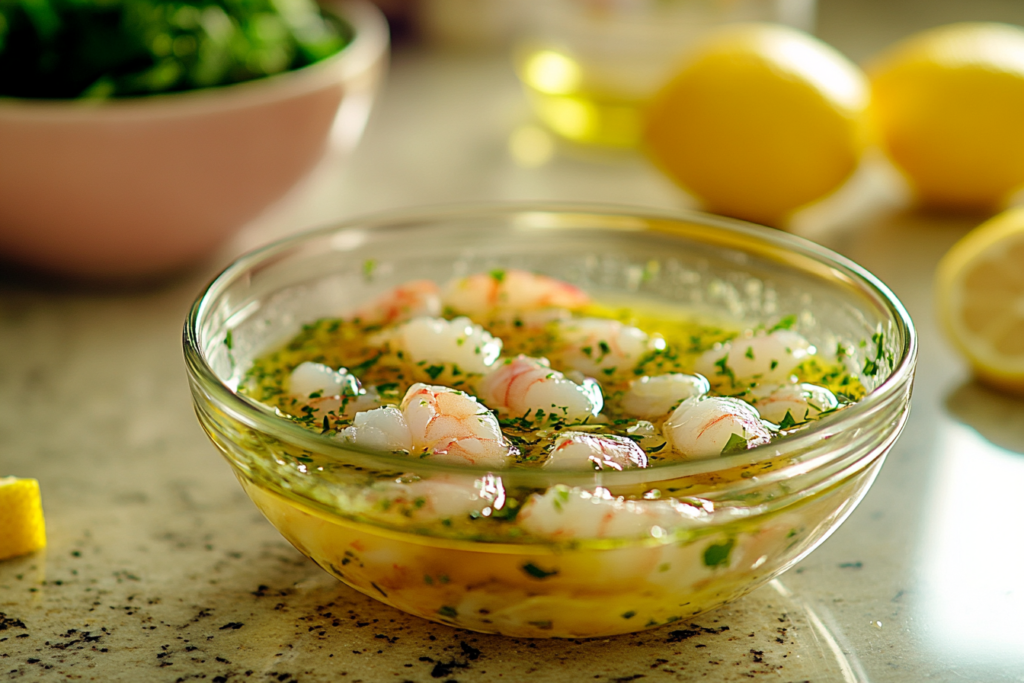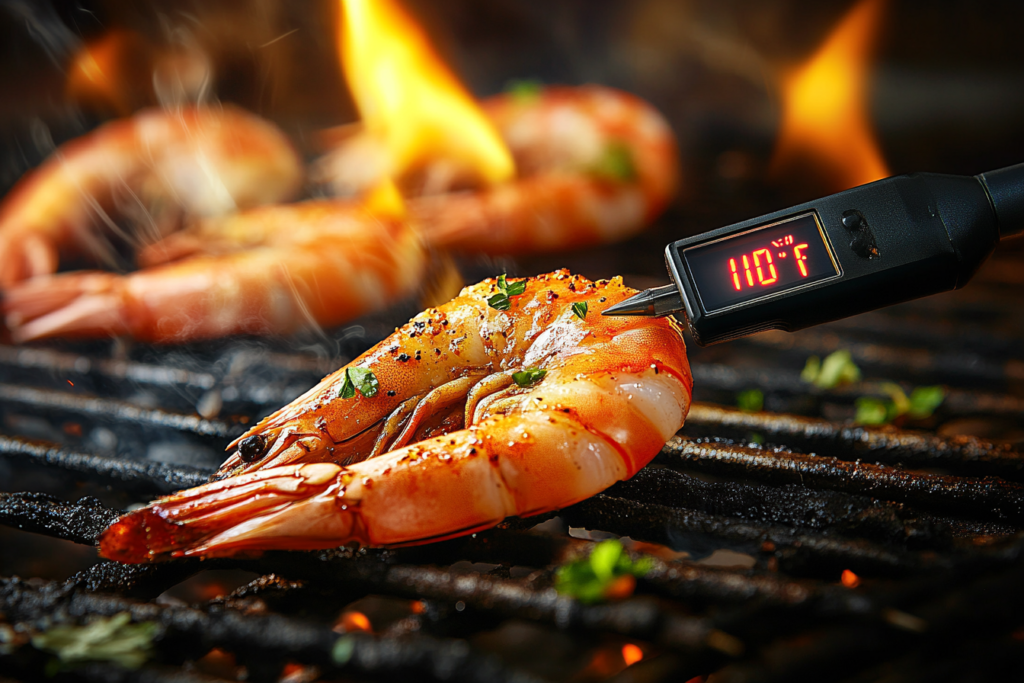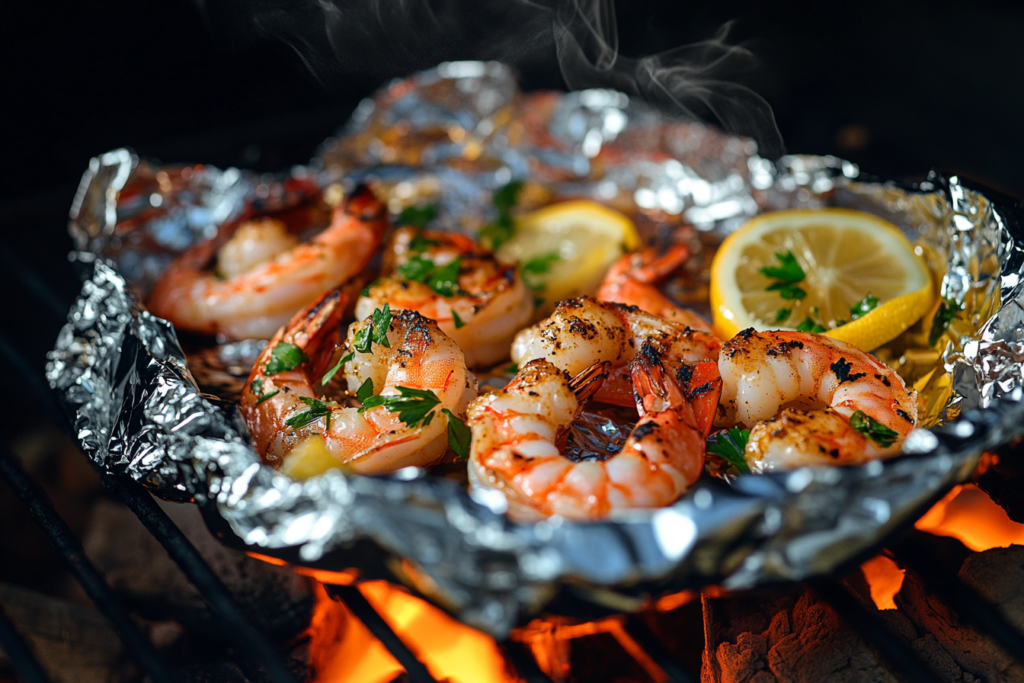Grilling shrimp is like walking a tightrope—you’re balancing between juicy, tender perfection and dry, rubbery disappointment. If you’ve ever wondered how to nail that perfect grill without sacrificing the shrimp’s natural succulence, you’re not alone. Shrimp is delicate, and grilling can be a tricky business, but with the right techniques and a little know-how, you’ll be the master of moist grilled shrimp in no time.
Let’s dive into the secrets, science, and tips behind keeping shrimp moist while grilling, making every bite an absolute delight.
How to Keep Shrimp Moist While Grilling: Why It’s a Challenge
Grilling shrimp can be tricky because it’s so easy to overcook them. If you’ve ever ended up with dry, rubbery shrimp, you’re not alone. Learning how to keep shrimp moist while grilling starts with understanding why they dry out and what you can do to prevent it.
The Science Behind Dry Shrimp While Grilling
Shrimp are mostly water, and when exposed to high heat, this moisture evaporates quickly. To prevent this, focus on techniques like brining or marinating. These simple steps create a moisture barrier, which is essential for those wondering how to keep shrimp moist while grilling successfully.
Avoiding Common Mistakes When Grilling Shrimp
- Overcooking: This is the shrimp killer. Even 30 seconds too long on the grill can turn moist shrimp into dry, rubbery bites.
- Skipping Prep: If you throw unseasoned shrimp straight onto the grill, you’re setting yourself up for failure. Without some prep, the shrimp have no protection against the heat.
- Improper Temperature Control: Too high, and you’re drying them out. Too low, and you risk undercooking or uneven results.
Understanding these pitfalls is half the battle. Now, let’s talk solutions!
Choosing the Right Shrimp to Keep Them Moist While Grilling
Not all shrimp are created equal. Picking the right shrimp is your first step toward achieving juicy perfection. It’s like choosing the best apples for a pie—you need the right type to get the best results.
Fresh vs. Frozen Shrimp for Moist Grilling
Here’s the deal: frozen shrimp are often fresher than “fresh” ones you see at the market. Why? Most shrimp are frozen right after being caught, locking in their natural moisture and flavor. If you live far from the coast, those “fresh” shrimp have likely been thawed and sitting around for a while.
When buying frozen shrimp:
- Look for shrimp labeled IQF (individually quick frozen).
- Avoid shrimp with freezer burn or ice crystals.
If you go for fresh shrimp, make sure they smell like the sea—sweet and briny—not fishy.
Best Shrimp Sizes for Juicy Grilled Shrimp
Bigger is better. Large shrimp, like 16/20 count per pound, are perfect for grilling because they’re less likely to dry out. Smaller shrimp cook so fast that it’s easy to overdo them. Plus, larger shrimp make a better visual statement on your plate.
Deveining and Shell Tips to Lock in Moisture
Deveining shrimp might seem tedious, but trust me, it’s worth it. That “vein” is actually the shrimp’s digestive tract (yep, gross), and leaving it in can give your shrimp a bitter, gritty taste.
- Leave the shell on: If you’re worried about moisture, keep the shells on while grilling. They act as a natural barrier against heat, trapping moisture inside. Just make sure to slit the back and remove the vein.
- Shell-off for flavor absorption: If you’re using a marinade, peel the shrimp so the flavors can soak in fully.
Preparing Shrimp: The Key to Keeping Them Juicy on the Grill
Preparation is the unsung hero of great grilling. Skip this step, and you’re already at a disadvantage. Let’s go over some ways to set your shrimp up for success.
Cleaning and Marinating Shrimp for Moisture
Before anything, give your shrimp a good rinse under cold water. Pat them dry with a paper towel—moisture on the surface can prevent marinades from sticking.
Now, onto marinades! These not only add flavor but also help keep your shrimp juicy. Think of marinades as a shrimp’s spa treatment, locking in moisture and flavor before they hit the grill.

Best marinade ingredients for moisture retention:
- Acid: Lemon or lime juice tenderizes shrimp.
- Oil: Olive oil or sesame oil creates a barrier that locks in moisture.
- Aromatics: Garlic, ginger, or herbs like cilantro add a punch of flavor.
Let the shrimp marinate for at least 15-20 minutes, but not more than an hour. Over-marinating, especially with acidic ingredients, can make shrimp mushy.
The Role of Brining in Keeping Shrimp Juicy
Ever tried brining shrimp? It’s a game-changer. A simple brine of water, salt, and a touch of sugar can work wonders. Salt helps the shrimp retain moisture, while sugar caramelizes on the grill, adding a slight sweetness.
Here’s a quick recipe:
- 4 cups water
- 3 tablespoons kosher salt
- 2 tablespoons sugar
Soak your shrimp in the brine for 30 minutes, rinse, and pat dry. You’re now ready to grill like a pro!
The Importance of Marinades
If shrimp were the star of a show, marinades would be the director—quietly working behind the scenes to ensure everything turns out perfect. Marinades not only infuse flavor into the shrimp but also help protect them from drying out under the intense heat of the grill.
Ingredients That Lock in Moisture
So, what makes a marinade truly magical? It’s all about balance. You want ingredients that enhance flavor while keeping the shrimp moist. Here are some must-haves for your shrimp marinade:
- Acidic Components: Think citrus juices like lemon, lime, or even orange. These add brightness and tenderize the shrimp by breaking down proteins slightly.
- Fats: Oils such as olive oil or avocado oil coat the shrimp, creating a protective layer that locks in moisture during grilling.
- Salt: A pinch of salt in your marinade not only enhances flavor but also helps the shrimp hold onto their natural juices.
- Herbs and Spices: Garlic, chili flakes, paprika, fresh cilantro, or parsley bring a whole new level of deliciousness.
Here’s a quick go-to marinade recipe for moist grilled shrimp:
- ¼ cup olive oil
- 2 tablespoons lemon juice
- 3 garlic cloves, minced
- 1 teaspoon smoked paprika
- ½ teaspoon salt
- A pinch of chili flakes (optional)
Mix everything, toss it with the shrimp, and let them soak up the goodness for 20–30 minutes.
Best Marinades for Grilled Shrimp
Want to shake things up? Here are some flavor-packed marinades you can try:
- Mediterranean Marinade: Olive oil, lemon zest, garlic, oregano, and a dash of white wine.
- Asian-Inspired Marinade: Soy sauce, sesame oil, ginger, garlic, and a touch of honey for sweetness.
- Spicy Cajun Marinade: Olive oil, Cajun seasoning, garlic, and fresh lime juice.
Experiment with these marinades to find your signature flavor. And remember, don’t marinate for too long—shrimp are delicate and can become mushy if left soaking for hours.
Grilling Techniques for Moist Shrimp
Now that you’ve got your shrimp prepped and your tools ready, it’s time to hit the grill. But how do you ensure your shrimp stay moist and tender throughout the process? It all comes down to technique.
Preheating the Grill for Even Cooking
This step is non-negotiable. Always preheat your grill for at least 10–15 minutes before adding your shrimp. A hot grill ensures:
- Even cooking.
- Prevents shrimp from sticking to the grates.
- Seals in the juices quickly.
Set your grill to medium-high heat (around 375–400°F). This is the sweet spot for grilling shrimp without drying them out.
Direct vs. Indirect Heat
When grilling shrimp, you’ll mostly be using direct heat. This means placing the shrimp directly over the flame or heat source for quick, even cooking.
However, if you’re grilling larger shrimp or shrimp wrapped in foil, you might want to use a mix of direct and indirect heat. Start with direct heat to get that charred exterior, then move them to indirect heat to finish cooking gently.
Timing and Flipping for Optimal Results
Here’s the golden rule: shrimp cook fast. Like really fast. Overcooking is the number one reason shrimp turn out dry. Follow these guidelines:
- Grill each side for 2–3 minutes. The shrimp should turn pink and opaque with a slight char.
- Flip only once. Over-flipping disturbs the grill marks and can make the shrimp unevenly cooked.
Keep a close eye—shrimp can go from perfectly cooked to overdone in a blink!
Temperature Guidelines for Grilled Shrimp
Cooking shrimp to the right temperature is like hitting the perfect note in a song—it’s essential for success. Overcooked shrimp become rubbery, while undercooked shrimp are unsafe to eat. Let’s talk about how to strike the perfect balance.

Internal Temperature to Prevent Overcooking
Shrimp are fully cooked when their internal temperature reaches 120°F (49°C). At this point, the proteins are set, the shrimp turn a vibrant pink, and the texture is tender. Anything beyond this temperature, and you risk drying them out.
Unlike meats like chicken or steak, shrimp cook almost instantly. Because of this, it’s best to remove them from the grill just as they hit 120°F. Residual heat will continue to cook them for a few seconds after they’re taken off.
How to Monitor Temperature Accurately
Invest in a digital instant-read thermometer. It’s a small tool, but it makes a huge difference in ensuring perfectly cooked shrimp every time. To measure the temperature:
- Insert the thermometer into the thickest part of the shrimp (typically the center of the body).
- Avoid touching the grill or skewers with the thermometer to get an accurate reading.
Pro Tip: If you’re grilling a large batch of shrimp, check the temperature of a few pieces from different areas of the grill. This ensures consistency across the board.
Using Butter and Oils
When it comes to keeping shrimp moist while grilling, butter and oils are your best friends. These fats not only add incredible flavor but also act as a protective layer, sealing in the shrimp’s natural juices.
How Fats Contribute to Moisture Retention
Here’s the science: fats like butter and oils coat the surface of the shrimp, creating a barrier that slows down moisture loss during cooking. Think of it as a little raincoat for your shrimp, keeping them juicy even under the intense heat of the grill.
Butter also adds a richness that enhances the shrimp’s natural sweetness, while oils like olive oil or sesame oil provide a subtle nuttiness.
Best Oils for Grilling Shrimp
Not all oils are created equal. When grilling, you want oils with a high smoke point to prevent burning. Here are a few great options:
- Olive Oil: A versatile option with a mild flavor that pairs well with most marinades.
- Avocado Oil: Has a high smoke point and a buttery texture.
- Sesame Oil: Adds a nutty, toasty flavor, perfect for Asian-inspired marinades.
For an extra punch of flavor, try mixing your oil with herbs, spices, or a squeeze of lemon before brushing it onto the shrimp.
Wrapping Shrimp in Foil or Parchment
If you’re looking for a foolproof way to keep shrimp moist, wrapping them in foil or parchment is the ultimate hack. This method locks in steam, essentially poaching the shrimp while they grill.

Benefits of Wrapping Shrimp Before Grilling
Wrapping shrimp isn’t just for beginners; it’s a technique even seasoned grill masters swear by. Here’s why it works:
- Locks in Juices: The steam trapped inside the foil or parchment keeps the shrimp moist and tender.
- Even Cooking: This method eliminates the risk of overcooking, as the heat is more evenly distributed.
- Infuses Flavors: Any marinade, herbs, or spices you include inside the wrap will penetrate deeply into the shrimp.
Recipes for Foil-Wrapped Shrimp
Want to try this technique? Here’s a simple recipe to get started:
Garlic Butter Foil-Wrapped Shrimp
- Ingredients: Shrimp, minced garlic, melted butter, lemon slices, parsley, salt, and pepper.
- Method: Toss the shrimp in melted butter and garlic, then arrange them on a sheet of foil. Add lemon slices and parsley, then seal the foil tightly. Grill over medium heat for 8–10 minutes.
The result? Perfectly juicy shrimp with minimal effort!
The Role of Basting During Grilling
Basting is the secret weapon that adds both moisture and flavor to your shrimp while grilling. It’s like giving your shrimp a hydration boost mid-cook.
How Basting Preserves Shrimp Juiciness
Basting involves brushing a liquid—like butter, oil, or a marinade—over the shrimp while they cook. This process replenishes lost moisture and forms a thin, flavorful glaze on the surface.
Best Basting Sauces for Grilled Shrimp
Here are a few basting sauces that work wonders:
- Garlic Lemon Butter: Melted butter with minced garlic and a splash of lemon juice.
- Honey Soy Glaze: A mix of honey, soy sauce, and a touch of sesame oil.
- Herbed Olive Oil: Olive oil infused with fresh rosemary, thyme, and a pinch of red pepper flakes.
When basting, apply the sauce every 1–2 minutes for maximum flavor without overloading the shrimp.
Recipes for Moist Grilled Shrimp
Now that you know the techniques, it’s time to put them into action. Here are two simple, mouthwatering recipes to try.
Classic Lemon Garlic Shrimp
Ingredients:
- 1 lb large shrimp, peeled and deveined
- ¼ cup olive oil
- 2 tablespoons fresh lemon juice
- 3 garlic cloves, minced
- 1 teaspoon smoked paprika
- Salt and pepper to taste
Instructions:
- In a bowl, whisk together olive oil, lemon juice, garlic, smoked paprika, salt, and pepper.
- Toss the shrimp in the marinade and let sit for 20 minutes.
- Preheat your grill to medium-high heat and oil the grates.
- Thread the shrimp onto skewers and grill for 2–3 minutes per side, until pink and opaque.
- Serve with lemon wedges and enjoy!
Cajun-Spiced Foil-Wrapped Shrimp
Ingredients:
- 1 lb large shrimp, peeled and deveined
- 2 tablespoons Cajun seasoning
- 2 tablespoons melted butter
- 1 teaspoon garlic powder
- Lemon slices
Instructions:
- In a bowl, toss the shrimp with Cajun seasoning, melted butter, and garlic powder.
- Lay a sheet of foil on the counter and arrange the shrimp in the center. Add lemon slices on top.
- Fold the foil into a packet, sealing the edges tightly.
- Grill the packet over medium heat for 8–10 minutes.
- Carefully open the packet and serve immediately.
When grilling shrimp, it’s essential to get the right techniques for locking in moisture and flavor. For instance, keeping the shell on versus shell off while grilling can impact the juiciness of the shrimp, as explained in Barbecue Shrimp: Shell-On vs. Shell-Off. Additionally, if you’re exploring ways to infuse your grilled shrimp with bold flavors, check out these tips for the Best Way to Barbecue Shrimp: Tips for Perfect Flavor. For a deeper dive into complementary recipes, try this flavorful BBQ Shrimp Recipe: Ultimate Guide, which pairs well with the techniques shared here. Each of these methods can elevate your grilling game, ensuring your shrimp remain tender and mouthwateringly delicious.
FAQs About Grilled Shrimp
Here are answers to common questions that might pop up when grilling shrimp:
How to Keep Shrimp from Drying Out on the Grill?
To keep shrimp from drying out on the grill, marinate them in a mixture of oil, acid (like lemon juice), and seasonings to lock in moisture. Use medium-high heat, grill them quickly (2–3 minutes per side), and avoid overcooking. Threading shrimp on skewers or grilling them in foil packets can also help retain their natural juices.
How to Keep Shrimp Juicy When Cooking?
The key to juicy shrimp is preparation. Brining shrimp in a mixture of water, salt, and sugar for 30 minutes helps them retain moisture during cooking. Use marinades with oil for extra protection and cook shrimp quickly over high heat to seal in the juices. Rest the shrimp for a couple of minutes after cooking to allow the moisture to redistribute.
What is the Secret to Juicy Shrimp?
The secret to juicy shrimp lies in not overcooking them. Shrimp cook fast—about 2–3 minutes per side on the grill or until they turn pink and opaque. Pair this with techniques like brining, marinating, or basting while grilling to enhance flavor and moisture.
Why Did My Shrimp Get Mushy on the Grill?
Shrimp can become mushy if they are over-marinated, especially in acidic mixtures like lemon or vinegar. Acid breaks down proteins in shrimp too much, leading to a mushy texture. To avoid this, limit marinating time to 15–30 minutes and use fresh, high-quality shrimp for grilling.

